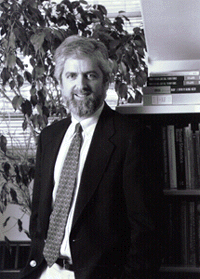|
|
Examining Welfare Reform and FamiliesBy Leslie RiceHomewood |

How will the far-reaching changes in the nation's welfare laws affect children and families in poor urban neighborhoods? When parents leave the welfare rolls, will they find steady work? Will their families face increased hardship? Will their children benefit or suffer?
These are the questions to be addressed in a four-year, $19 million study of 3,000 families in Boston, Chicago and San Antonio by re-searchers at Johns Hopkins and several other universities. The study, which was officially announced Dec. 15, begins just as many states will be removing families from the welfare rolls when their two-year time limits expire in January 1999. (The study's website is located here: www.jhu.edu/~welfare/.)
 Andrew
Cherlin, the Benjamin H. Griswold III Professor of Public
Policy in the
Department of Sociology,
will coordinate the project. Cherlin has written widely about
the changing American family and children's well-being. He will
be joined on the project by
Robert Moffitt, a professor in the
Department of Economics
and
one of the leading
experts on the economic effects of welfare. Both professors have
joint appointments in
the Krieger School of Arts and Sciences and
the School of Public Health.
Andrew
Cherlin, the Benjamin H. Griswold III Professor of Public
Policy in the
Department of Sociology,
will coordinate the project. Cherlin has written widely about
the changing American family and children's well-being. He will
be joined on the project by
Robert Moffitt, a professor in the
Department of Economics
and
one of the leading
experts on the economic effects of welfare. Both professors have
joint appointments in
the Krieger School of Arts and Sciences and
the School of Public Health.
"To many people, the welfare story ends when families go off the rolls," Cherlin said. "We want to document what happens to parents and children in the months and years afterward.
"Supporters of the new laws think that children will benefit because their mothers will find jobs, feel better about themselves and be better parents and role models. Critics think that many children will suffer because their mothers will be unable to make the transition to the work force and will face greater distress," he said. "In truth, no one knows for sure what will happen. This is the greatest social experiment with the lives of poor children since the welfare program was created during the Great Depression."
The study will identify 2,800 low-income families, half of them receiving welfare, and then interview them three times over a four-year period beginning in March 1999. Researchers will collect much more detailed information about children's social and cognitive development than most household surveys including, for 800 families with at least one child between the ages of 2 and 4, visits to daycare settings, where they will rate the quality of the care given; interviews with fathers; and videotaping of mothers and children doing activities together.
"An additional 200 families will be observed closely by field workers, who will go to job interviews with them, accompany them to the welfare office and get to know the rhythm of their daily lives.
"We hope to get a real sense of how the changes in these laws affect parents and children, but we also want to learn more about how poverty affects children," said Cherlin. "So, we'll be studying these families over time to see how their lives change as they move in and out of poverty. We don't think any one social science method can provide all the answers to these questions. That's why we'll be using a combination of surveys, detailed observations and anthropological field work."
Other project collaborators will include psychologist P. Lindsay Chase-Lansdale, at the University of Chicago; urban policy expert William Julius Wilson, at Harvard University; sociologist Linda Burton, at Pennsylvania State University; and sociologist Ronald Angel, of the University of Texas.
The study will be supported by grants to Hopkins of $12 million from the National Institute of Child Health and Human Development, a unit of the National Institutes of Health; $1.2 million from the Office of the Assistant Secretary for Planning and Evaluation and the Administration for Developmental Disabilities of the Department of Health and Human Services; $1 million from the W. K. Kellogg Foundation; and $500,000 from the Annie E. Casey Foundation. It will also be supported by grants to other universities from the Robert Wood Johnson Foundation, the John D. and Catherine T. MacArthur Foundation, the Joyce Foundation, the Lloyd A. Fry Foundation, the Woods Fund of Chicago, the Charles Stewart Mott Foundation and the Hogg Foundation. Grants from the Boston Foundation to Harvard University and the Edna McConnell Clark Foundation to Johns Hopkins supported preliminary research.
| GO TO JANUARY 4, 1999 TABLE OF CONTENTS. |
| GO TO THE GAZETTE HOMEPAGE. |